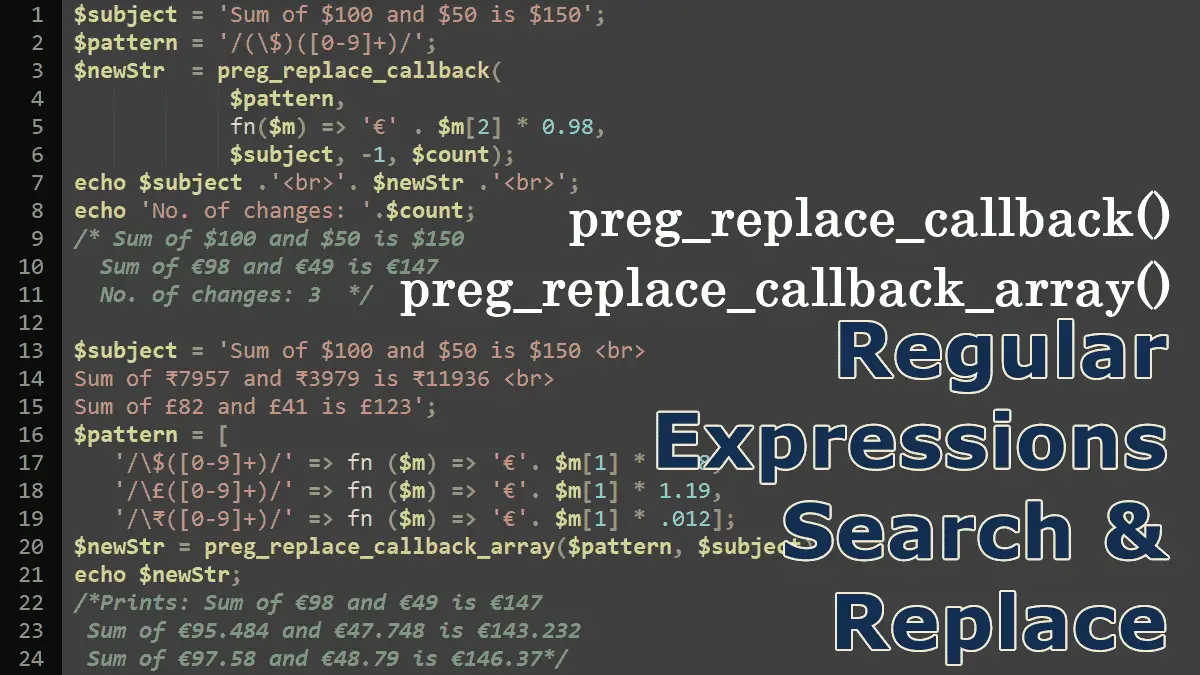preg_replace_callback()
//Syntax
<?php
preg_replace_callback(
string|array $pattern,
callable $callback,
string|array $subject,
int $limit = -1,
int &$count = null,
int $flags = 0
): string|array|null
The preg_replace_callback() function takes six parameters:
$pattern: The regular expression as a string or a string array to search for.$callback: The callback function, pass the function name as a string or use an anonymous function to declare the callback.$subject: The input string or array to search through.$limit(optional): The maximum possible replacements, default to-1(no limit).&$count(optional): If specified, this variable will be filled with the number of replacements done.$flags(optional): A combination of thePREG_OFFSET_CAPTUREandPREG_UNMATCHED_AS_NULLflags, see preg_match() tutorial for more details.
This function works the same as the preg_repalce() except that it takes the $callback function instead of the $replacement string.
The callback function will be called and passed an array of matched elements in the subject string. The first element of the array contains the whole matched text, and additional array elements contain any matched subpatterns. See the following example:
<?php
$subject = '$100';
$pattern = '/(\$)([0-9]+)/';
$newStr = preg_replace_callback($pattern, 'CB', $subject);
function CB($m) {
echo $m[0].'<br>'; # $100 - the complete match
echo $m[1].'<br>'; # $ - first subpattern match
echo $m[2].'<br>'; # 100 - second subpattern match
}
You can change the matched text with your own algorithm and return the changed text as the replacement text. See the following example, we just created a currency conversion tool that converts the USD to EUR from the subject:
<?php
$subject = 'Sum of $100 and $50 is $150';
$pattern = '/(\$)([0-9]+)/';
$newStr = preg_replace_callback($pattern, 'CB', $subject);
function CB($m) {
$euro = $m[2] * 0.98;
return '€'.$euro;
}
echo $newStr;
#Prints: Sum of €98 and €49 is €147
Instead of using a regular function as the callback you can use an anonymous function:
<?php
$subject = 'Sum of $100 and $50 is $150';
$pattern = '/(\$)([0-9]+)/';
$newStr = preg_replace_callback(
$pattern,
function ($m){
$euro = $m[2] * 0.98;
return '€'.$euro;
},
$subject, -1, $count
);
echo $subject .'<br>'. $newStr .'<br>';
echo 'No. of changes: '.$count;
/* Sum of $100 and $50 is $150
Sum of €98 and €49 is €147
No. of changes: 3
*/
Since PHP 7.4, you can also use arrow function as it has a more concise syntax:
<?php
$subject = 'Sum of $100 and $50 is $150';
$pattern = '/(\$)([0-9]+)/';
$newStr = preg_replace_callback(
$pattern,
fn($m) => '€' . $m[2] * 0.98,
$subject, -1, $count
);
echo $subject .'<br>'. $newStr .'<br>';
echo 'No. of changes: '.$count;
/* Sum of $100 and $50 is $150
Sum of €98 and €49 is €147
No. of changes: 3
*/
preg_replace_callback_array()
<?php
//Syntax
preg_replace_callback_array(
array $pattern,
string|array $subject,
int $limit = -1,
int &$count = null,
int $flags = 0
): string|array|null
The preg_replace_callback_array() function takes five parameters:
$pattern: An associative array mapping patterns (keys) to callables (values).$subject: The input string or array to search through.$limit(optional): The maximum possible replacements, default to-1(no limit).&$count(optional): If specified, this variable will be filled with the number of replacements done.$flags(optional): A combination of thePREG_OFFSET_CAPTUREandPREG_UNMATCHED_AS_NULLflags, see preg_match() tutorial for more details.
The preg_replace_callback_array() function introduced in PHP 7. This function allows you to specify an array of patterns (regular expressions) as keys, with the value representing an independent callback function.
When a pattern (array key) matched, the corresponding callback function will be called and passed an array of matched elements in the subject string.
Similar to the preg_replace_callback() function the first element of the array contains the whole matched text, and additional array elements contain any matched subpatterns. In the following example, we created a separated pattern for each currency, and when the specific currency pattern matched, its value, a callback function, executes:
<?php
$subject =
'Sum of $100 and $50 is $150 <br>
Sum of ₹7957 and ₹3979 is ₹11936 <br>
Sum of £82 and £41 is £123';
$pattern = ['/\$([0-9]+)/' => 'usdToEur',
'/\£([0-9]+)/' => 'gbpToEur',
'/\₹([0-9]+)/' => 'inrToEur' ];
$newStr = preg_replace_callback_array($pattern, $subject);
function usdToEur($m) {
return '€'. $m[1] * 0.98;
}
function inrToEur($m) {
return '€'. $m[1] * 0.012;
}
function gbpToEur($m) {
return '€'. $m[1] * 1.19;
}
echo $newStr;
/*Prints:
Sum of €98 and €49 is €147
Sum of €95.484 and €47.748 is €143.232
Sum of €97.58 and €48.79 is €146.37*/
Example: Using anonymous functions with preg_replace_callback_array:
<?php
$subject =
'Sum of $100 and $50 is $150 <br>
Sum of ₹7957 and ₹3979 is ₹11936 <br>
Sum of £82 and £41 is £123';
$pattern = [
'/\$([0-9]+)/' => function ($m) {return '€'. $m[1] * 0.98;},
'/\£([0-9]+)/' => function ($m) {return '€'. $m[1] * 1.19;},
'/\₹([0-9]+)/' => function ($m) {return '€'. $m[1] * 0.012;}];
$newStr = preg_replace_callback_array($pattern, $subject);
echo $newStr;
/*Prints:
Sum of €98 and €49 is €147
Sum of €95.484 and €47.748 is €143.232
Sum of €97.58 and €48.79 is €146.37*/
Example: PHP 7.4 allows you to use arrow functions:
<?php
$subject =
'Sum of $100 and $50 is $150 <br>
Sum of ₹7957 and ₹3979 is ₹11936 <br>
Sum of £82 and £41 is £123';
$pattern = [
'/\$([0-9]+)/' => fn ($m) => '€'. $m[1] * 0.98,
'/\£([0-9]+)/' => fn ($m) => '€'. $m[1] * 1.19,
'/\₹([0-9]+)/' => fn ($m) => '€'. $m[1] * .012];
$newStr = preg_replace_callback_array($pattern, $subject);
echo $newStr;
/*Prints:
Sum of €98 and €49 is €147
Sum of €95.484 and €47.748 is €143.232
Sum of €97.58 and €48.79 is €146.37*/
More Regular Expressions Tutorials:
- Regular Expressions
- Matching patterns using preg_match() and preg_match_all()
- Splitting long paragraphs using preg_match_all() function
- Cleanup Text by Removing Extra Spaces (Except Newlines)
- Search and replace with preg_replace() and preg_filter()
- Search and replace with preg_replace_callback() and preg_replace_callback_array()
